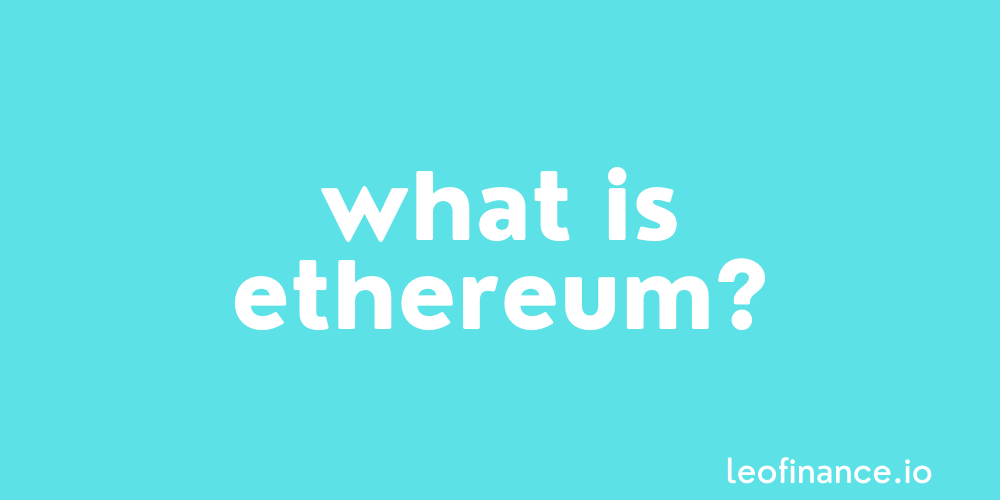
A beginner's guide to Ethereum, written to answer questions about ETH, gas, defi and more.
The first differentiation that needs to be made is between Ethereum the platform, and Ether (ETH) the currency.
Ethereum is the open-source, blockchain platform itself.
Ethereum can be thought of as a base layer of the new decentralised internet, on top of which decentralised applications (dApps) can run.
Ether (ETH) is the native cryptocurrency used by the Ethereum network.
While many people will use the words Ethereum and Ether interchangeably, it’s important that this introduction makes a differentiation between the two.
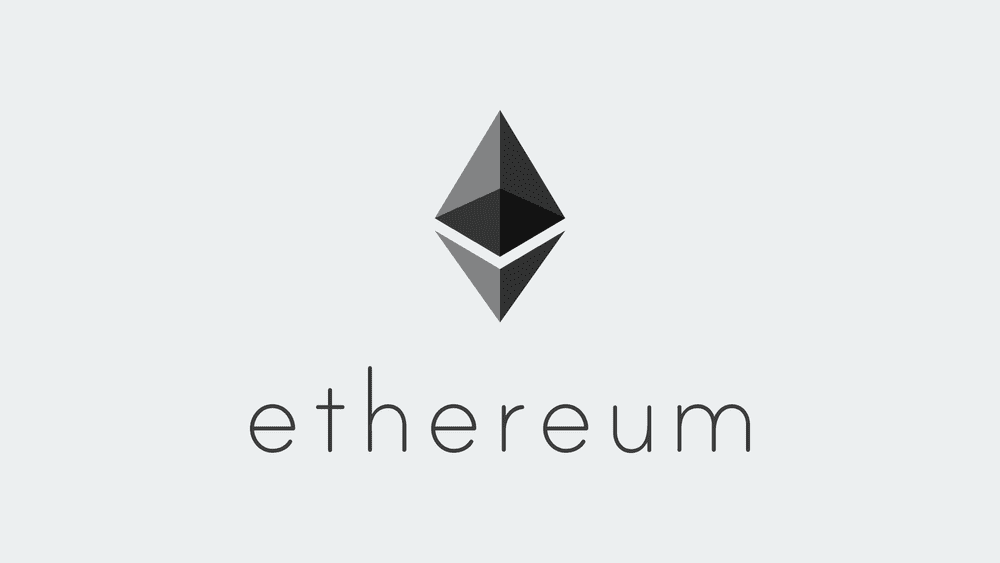
So when you’re buying ETH cryptocurrency from an exchange, you’re actually buying Ether which can then be used on the Ethereum platform.
Introduction to Ethereum
An introduction to Ethereum (ETH) that describes what it is, how it works and why it's different from Bitcoin.
Ethereum was founded by Vitalik Buterin and Gavin Wood in 2013.
While Vitaly "Vitalik" Buterin, the Russian-Canadian front-man for Ethereum was actually a co-founder, he’s definitely the face of the project.
Vitalik became involved in cryptocurrency quite early on the scene, co-founding Bitcoin Magazine in 2011 before making Ethereum a reality by eventually launching the network in 2015.
As we briefly mentioned above, the Ethereum platform is the base on which dApps are built, hosting what are known as smart contracts.
Smart contracts are a set of code that carries out a list of instructions, running immutably on the blockchain.
Think of smart contracts as code replacing a human third party required to act as an intermediary or verify something on an application.
They’re what gives Ethereum its power and sets it apart from Bitcoin and other purely money driven cryptocurrencies.
While Bitcoin is simply a payments network that is used to transfer value, Ethereum is a base layer for the entire decentralised internet to be built on top of.
Let’s use this Ethereum guide to explore how the platform works and why it’s such a game-changer.
Ethereum (ETH) vs Ethereum Classic (ETC)
To properly explain the differences between Ethereum (ETH) and Ethereum Classic (ETC) an examination into the history of this blockchain is necessary.
And the story begins in 2016 with a hack to a third party application (The DAO) on the Ethereum chain wherein approximately 3.6 million Ethereum was stolen (at the time worth approximately $50 Million).
Back in 2016 this amount was no insignificant amount, actually making up about 5% of the total ETH in circulation at the time.
The developers of Ethereum at the time decided that an erasure of the hack was in order and that the money stolen should be added back to the accounts of the original owners.
To accomplish this a hard fork of the chain was initiated.
The resulting new ledger created (the one reversing the hack and restoring the accounts), became what we now know as the main 'Ethereum Blockchain' (ETH).
While the original unchanged version of the ledger (containing the hack), was renamed to what we now know as Ethereum Classic (ETC).
While this hard fork of Ethereum may seem confusing, it is not so if the divide is viewed in terms of the philosophy serving as the basis behind each of the choices:
(ETH): If you accept a revised distributed ledger in a blockchain that was altered to remove a successful hack from its record.
(ETC): If you prefer an unchanged (immutable) ledger containing the entire history of the chain, including the successful hack.
Ethereum (ETH)
The ETH chain to this day remains the more popular choice of the two.
The majority of users, especially those who lost coins in the hack, chose the ETH chain.
In addition, the ETH chain is supported by one Vitalik Buterin, the project's main creator.
Vitalik's reputation and influence is widely accepted by the Ethereum community, as well as the cryptocurrency community as a whole.
Ethereum Classic (ETC)
However, the foregoing does not negate the fact that the ETC community possesses support as well, just to a lesser degree.
It is these ETC supporters who adhere to the original ledger as it contains the true unchanged history of the chain.
It is the belief of ETC supporters, that this hard fork decried the "code is king" spirit and prevention of subjective human manipulation climate for which was the purpose of developing blockchain technology in the first place.
Their position is firm, in contrast to ETH, that immutable transactions are an incontrovertible basis of the blockchain which sets the blockchain apart from the manipulations present in traditional financial structures.
It is the clear tenet of the ETC proponents that an immutable ledger should not be compromised, even for the best of intentions.
Structural differences between ETH and ETC
Turning now to the structural elements of the ETH chain and the ETC chain, the two are not dissimilar at all as the ETC chain is essentially a clone of the ETH chain.
Both systems are purposed to be smart contract platforms upon which decentralized applications may be built, so the functionality aspects of both are identical.
In fact, the chains are truly identical up to block 1,920,000 when the hack originally occurred and it was at this block the two systems diverged.
From block 1,920,000 forward, any update to the protocol of one of the chains is no longer present in the other chain with the reverse being held true as well.
With the coming transformation of the ETH system from a Proof-of-Work to a Proof-of-Stake consensus mechanism, more commonly referred to as "ETH 2.0", a major upgrade will occur in the ETH protocol.
But the same, this won't be reflected in the ETC protocol as it's now a completely separate blockchain.
As such, a further significant divergence in the structural functionality of the two systems will be experienced.
But as time has passed since the original hard fork, it has become apparent that the ETC chain may be relaxing its strict interpretations policies and seeking greater interoperability with ETH (and other blockchains).
The ETC community experienced two major upgrades on this front - in 2019, Atlantis and in 2020, Agharta.
Final thoughts on ETH vs ETC
Going forward only time will tell if the various splits and forks in the overall Ethereum ecosystem will permit both ETH and ETC to achieve a degree of interoperability.
While managing to independently further development within their own separate communities.
All in accordance with the will of its community's members.
How does Ethereum work?
What follows is a very simplified and truncated explanation of the basic workings of the Ethereum blockchain.
It is simply a 'jumping off' point for an understanding of how the Ethereum blockchain works and in no way is meant to be exhaustive.
The Ethereum blockchain
The operative work of Ethereum occurs on a blockchain network.
The blockchain is a decentralized, distributed public ledger where all transactions are verified and recorded.
Let's understand what these terms mean.
A blockchain is 'distributed' in that all participants within the Ethereum network possess an identical copy of the ledger (where all past transactions may be viewed).
A blockchain is 'decentralized' in that it exists and operates without centralized governance (instead the network is managed by all distributed ledger holders).
For Ethereum, network security and verification of transactions, cryptography is used in each blockchain transaction.
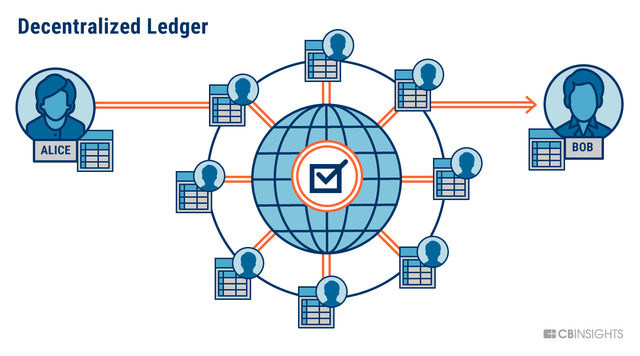
Mining
Anyone can use computers to 'mine' Ethereum.
Mining is using computers to solve complex mathematical equations, in essence by guessing the solution.
The result of this 'mining' is to confirm each blockchain transaction and add new blocks to the blockchain which is the basis of the system.
The reward for participation in this activity is cryptocurrency tokens which in the Ethereum ecosystem are called 'Ether' (ETH).
Trustless
Likewise, anyone may create a financial contract, keep debt, or maintain ownership registries on the ledger in the absence of an outside recordkeeper or trust officer.
Transactions of this nature are called 'trustless'.
These transactions are 'trustless' due to the elimination of the need for trusting the counterparty in that the underlying contract, by code, is self-fulfilling.
Smart contracts
Simply put, a smart contract is nothing more than a software program that runs on a blockchain.
In other words, it is a digital automated agreement or terms and conditions that only execute when certain agreements within the contract have been met.
Smart contracts are one type of Ethereum account, meaning they have a balance and can send transactions over the network.

The smart contract is not controlled by one party or the other in the transaction.
Instead, smart contracts are deployed on the network and operate as programmed by code.
Interaction by a user with the smart contract occurs when transactions are submitted that execute a function defined within the parameters of the specific smart contract.
The smart contract defines the rules of the underlying transaction (much the same way as a regular contract) and automatically enforces the terms of the transaction by the code of the programmed smart contract.
Decentralized applications
The Ethereum Blockchain is unique as it is so much more than merely a distributed ledger.
This blockchain allows for the construction of software coded applications to be built on top of the existing chain.
These decentralized applications (DApps) operate on the Ethereum blockchain much like the way software runs on a computer.
DApps are coded applications that can store and transfer personal data as well as handle complex financial transactions (such as in the area of decentralized finance ['DeFi']).
Ethereum gas fees
Gas is the fuel needed to operate the Ethereum network, much the same way a motor vehicle requires gas to run.
On this blockchain, gas refers to a unit of measurement corresponding with the required computational effort needed to execute a specific operation on the network.
In that each individual Ethereum transaction requires computational resources to run, each individual transaction requires paying gas.
Gas is the required fee to be paid to successfully execute a transaction on the Ethereum blockchain.
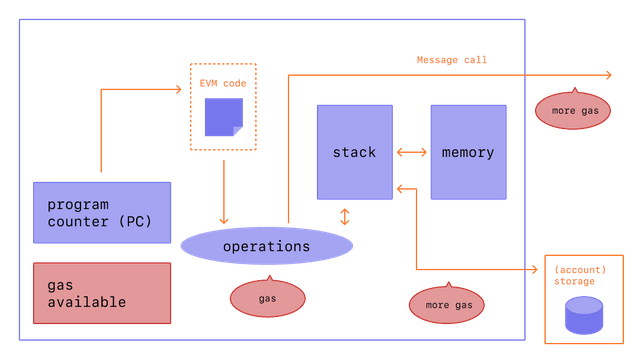
Gas fees are paid in Ether and are denoted in 'gwei'.
'Gwei' itself is merely a denomination of Ether equivalent to 10 to the -9th power of Ether (0.000000001 Eth).
For a further understanding of gas fees, reference is made to the following video:
Final thoughts on How Ethereum works
As stated at the onset of this article, this consisted of a very short and simplified look into the working of the Ethereum Blockchain.
Let’s now move on and take a look at what gives Ethereum value.
What gives Ethereum value?
Includes an item or two that we don't usually hear about from both legacy media and even cryptocurrency-oriented media.
As the leading altcoin in the cryptocurrency world-- and perhaps the consensus alternative to Bitcoin-- Ethereum offers much value to people using it.
Not only does the Ethereum platform make its ETH cryptocurrency attractive, but the platform itself also offers a full-blown environment for developing dApps and even systems.
Let’s take a look at some of the features that give Ethereum value.
It's Proven
Like its predecessor Bitcoin, Ethereum has tested during numerous highs and lows, during moments of (relative) calm and volatility.
Where other much more hyped altcoins shot to the stars only to flame out before reaching the moon, Ethereum stayed standing ready to keep moving forward.
While other altcoins survived to lurk in the background, Ethereum survived to be recognized as a leader along with Bitcoin.
Nearly everyone involved in some way with cryptocurrency will gladly accept BTC.
Despite the hype it's received in pop culture, not everyone will accept DOGE.
Just as many (if not as many) people will gladly accept payment in ETH.
If you're familiar with the early days of iPhone and Android (or even the web browser wars from the era before social media), then you can see something similar happening with cryptocurrencies.
As of 2021, Bitcoin and Ethereum are the Big 2.
Smart Contracts
Contrary to what many people new to cryptocurrency think, smart contracts originated with Ethereum (not Bitcoin).
According to global news and research portal CryptoNinjas:
In 2008, Bitcoin, the first cryptocurrency appeared, created on the basis of the revolutionary technology of blockchain, which previously lacked a decentralized ledger. The Bitcoin blockchain does not allow for conditions for concluding a transaction to be prescribed in a new block, as it only contains information on the transaction itself. Nonetheless, the technology’s appearance served as the impetus for developing smart contracts. Five years later, the blockchain platform Ethereum made it possible to use smart contracts in practice. Today the market offers many platforms that allow for the use of smart contracts, but Ethereum remains one of the most widespread.
(emphasis added)
Standardization
ERC-20 stands for "Ethereum Request for Comments 20."
It is the official Ethereum protocol seen as the common standard for creating tokens on the blockchain and implementing an API for tokens within Smart Contracts.
A number of well known tokens or cryptocurrencies are ERC-20 tokens, including Basic Attention Token (BAT) and Presearch Token (PRE).
The PRE whitepaper notes this property of ERC-20 tokens:
PRE tokens are hosted on the Ethereum platform as standard ERC20 blockchain tokens.
This means that PRE are transferable to any Ethereum compatible wallet that recognizes ERC20 tokens. Token holders are able to sell their PRE directly to any business or individual interested in generating Presearch results at whatever price the seller is able to obtain for their token inventory.
Without getting into too much detail, Ethereum can be used to create tokens for virtually anything:
- Representation of hard assets such as gold or other real property.
- Fungible assets such as stock shares or lottery tickets.
- A game character's skill set or reputation points on an online platform.
Versatility
The standardization noted above makes Ethereum highly versatile.
It allows Ethereum to be several things, including:
- A blockchain, and ETH is cryptocurrency which powers it.
- A tool for executing smart contracts, thus eliminating unnecessary intermediaries.
- A platform used for the development of dApps.
- A backbone for a decentralized internet.
The internet most of us think about is actually one root of a greater digital tree.
This branch is controlled by Internet Corporation for Assigned Names and Numbers (ICANN), and it uses the familiar Domain Name System (DNS) which lets us use text addresses instead of IP Addresses.
This is the centralized web of Web 2.0.
Web 3.0 on the other hand, is billed as the decentralized web and can take advantage of alternate roots.
This is what Unstoppable Domains does with the domains it offers.
Defi on Ethereum
DeFi is a collective term for financial products and services that are accessible to anyone.
DeFi is an open, global financial system that takes advantage of decentralised networks such as Ethereum.
An alternative to the current banking system that's opaque, tightly controlled and held together by decades-old infrastructure and processes.
With DeFi, the markets are always open and there are no centralised authorities who can block payments or deny you access to anything.
Services that were previously slow and at risk of human error are automatic and safer now that they're handled by code that anyone can inspect and scrutinize.
DeFi offers control and visibility over your money.
On Ethereum, there's already a booming decentralised financial service economy out there, where you can freely lend, borrow, long/short, earn interest, and more.
Defi ETH vs BSC
Decentalized Finance on Ethereum-- Defi ETH-- takes advantage of Ethereum's best known feature: Smart contracts.
While Bitcoin is used for sending BTC and receiving BTC, thanks to smart contracts ETH (and ERC-20 Tokens using Ethereum) becomes programmable money.
Use cases for programmable money include borrowing and lending, scheduling payments, and investing in index funds.
In the area of smart contracts, a competing cryptocurrency is BSC (Binance Smart Chain).
Both Ethereum and BSC make use of smart contracts for money-oriented purposes (lending, borrowing, etc.)
However, according to Werner Vermaak in a 5 March 2021 article on CoinMarketCap.com titled "What Is Binance Smart Chain?",
Binance Smart Chain has made immense traction in early 2021 so far partly thanks to Ethereum’s congestion and gas fee issues, which has caused developers and staking investors to look for other options. The BSC community made the network even more appealing to new users as a cost-effective and stable alternative, by lowering its gas fee from 15 Gwei to 10 Gwei to counter Binance Coin (BNB)’s insane price jump to over $300 in February.
Processing on Ethereum can be congested, and even if it was not it is costly in the Gas Fees charged for each transaction.
BSC charges an average fee of 7 Gwei and supports smart contracts, which are compatible with Ethereum (whose average transaction fee is around 95 Gwei).
When it comes to smart contracts, BSC is both faster and cheaper than Ethereum, but isn’t as decentralised.
Another point of comparison is the consensus model each uses.
BSC uses Proof of Stake (PoS), and at the moment Ethereum still uses Proof of Work (PoW).
PoW was made famous by Bitcoin, and intense resource usage is the biggest complaint about Bitcoin as heard in corporate media.
There are both pros/cons to using both ETH and BSC, although everything may change after the Ethereum switch to PoS is made by EOY 2021 and the transition from ETH to ETH2 is made sometime in 2022.
How can I keep my Ethereum (ETH) safe?
You can keep your ETH safe in a number of popular Ethereum wallets.
ETH can safely be stored using either hot or cold wallets.
The trick however, is understanding what you need to use your ETH for and how much day-to-day access you require to your coins.
In this section of the Ethereum guide, we go over the best Ethereum wallets for each use case.
The best Ethereum wallets
Unfortunately, there is no single Ethereum wallet that is best for everyone.
The best Ethereum wallet will come down to how you want to use your ETH.
For this reason, we’ve split this section of the guide up between active spenders, long term investors and day traders.
1. If you want to actively spend ETH
Are you an active user of the Ethereum blockchain?
This includes actively interacting with dApps built on Ethereum, such as the various Defi platforms and games.
MetaMask:
If you want an easy way to spend and send Ethereum via your browser, then MetaMask is for you.
MetaMask is an Ethereum wallet attached to a browser plugin.
It allows you to store and quickly use your ETH, as well as any other Ethereum based ERC-20 tokens you may have.
The wallet also allows you to safely connect to and interact with any Ethereum based dApps, all from your web browser.
In the simplest terms, a MetaMask wallet allows you to make Ethereum transactions through regular websites.
2. If you’re a long term investor
Maybe you’re actually just a long term investor who simply wants to store their ETH in the safest way possible?
If you don’t need fast access to your ETH and want the safest solution, then cold wallet storage is the solution for you.
Cold storage refers to an Ethereum wallet that is not connected to the internet.
The most common type of Ethreum cold storage device is an encrypted, portable device that stores your private keys offline and gives you access to your balance.
While you must transfer funds to a hot wallet in order to trade, you alone are responsible for your balance by having full control of your keys.
You can see that cold storage is a more secure option.
But Ethereum cold storage wallets are also less convenient, not to mention being expensive, with a good cold storage device costing in excess of $100 USD.
Best Ethereum cold storage devices:
- Trezor
- Ledger Nano S
3. If you’re an active trader
Lastly, maybe you’re an active day trader who requires the constant ability to trade your coins?
If you want to trade in and out, then use a hot wallet from your crypto broker of choice.
Put simply, Ethereum hot wallets refer to an address that is connected to the internet.
The Bitcoin stored in your broker's account is the most common type of hot wallet.
But if you’ve read any of our guides, you’d be familiar with the phrase "not your keys, not your crypto".
As your Ethereum wallet simply holds your private keys rather than physical coins, you’re essentially lending your crypto to the exchange.
When using a hot wallet, you are no longer in control of your private keys, so you’re no longer in control of your Ethereum.
Ethereum hot wallets offer the advantage of being accessible and making trading Ethereum easy as a few clicks on the crypto broker's platform.
In contrast, hot wallets require you to trust a third party with your keys.
A huge price to pay for convenience.
Best crypto brokers:
- Binance
- Bittrex
Final thoughts on keeping your ETH safe
You should only be leaving as much ETH in your hot wallet as you need to trade or transact within the extremely short term.
While you technically still control the private keys to your MetaMask wallet, the same could be said here because of other associated dangers with using a browser plugin.
The safest option for storing your ETH is as always, keeping them stored on a secure cold storage device.
While you lose the ability to potentially earn from Defi, cold storage is by far the safest option for your core investment.
Ethereum pros and cons
The good and bad of the Ethereum blockchain and ETH cryptocurrency.
Ethereum (ETH) is the biggest altcoin out there and one of the most widely used blockchain platforms. It's not just a currency but a platform of choice for many developers looking to create decentralized applications.
Both ETH & BTC have hit their all times high in 2021. Many people think that ETH will soon 'flip' Bitcoin and dominate the markets when it comes to total market capitalization.
In this section of the Ethereum guide, we are going to look at some of the major pros and cons of the Ethereum blockchain:
Ethereum pros
One of the biggest features of Ethereum is Smart Contracts.
It allows developers to build code that would execute when the set permissions are met on the blockchain. Since they are no middlemen, false play is avoided making the process more trustless.Ethereum is fully decentralized & transparent.
The number of nodes operating on the Ethereum Network around the globe is in thousands and no single entity owns the network. Every node has a copy of the ledger, hence nobody can actually tamper with the transactions.To perform transactions on the network one needs to pay Gas fees which avoids the network from downtime.
Also, a 51% attack on Ethereum is almost impossible since the network is distributed worldwide.Decentralized Finance is so hot right now and it dominated the crypto space in 2020.
Ethereum DeFi Ecosystem has gone so huge along with BSC, Polygon, Polkadot, Cardano, etc. It has transformed traditional financial products into trustless and transparent smart contracts that run without intermediaries. Providing complete financial freedom to everyone on the planet.Ethereum Foundation led by Vitalik Buterin (Co-founder, Ethereum) & its expanding developer community are the most important assets Ethereum has.
It provides a support system to the wider Ethereum community and promotes the development of Ethereum based applications and related technologies.Ethereum has multiple use cases like the creation of DAO (Decentralized Autonomous Organizations), ERC-20 based tokens, Stablecoins, NFTs etc.
It is attracting business from every domain anyone can think of. This drives the demand and usability of the coin.
Ethereum cons
Recently, Ethereum has been struggling with scalability issues & poor user experiences like High transaction costs (GAS Fees) and longer transaction times.
Even though Ethereum is the blockchain development platform of choice, but it has limitations.To solve the scalability issues Eth is undergoing a change from 'Proof of Work' to 'Proof of Stake' mining.
We still don't know if it's going to work or not. It's a lengthy process and the transition won't be easy.Ethereum undergoes frequent changes and it continues to evolve since it's an experiment.
This increases volatility in price since the future is uncertain.Learning curve is steep since the technology is new.
Very few resources are available for developers to understand and get up to speed.
Should I buy Ethereum?
Yes, you should consider buying the most popular smart contract enabled cryptocurrency Ethereum (ETH), right now.
Just remember that you’re not actually buying Ethereum, you’re buying the network’s native currency called Ether (ETH).
After buying ETH, you can then use it to interact with all of the decentralised applications (dApps) that are built on top of the Ethereum network itself.
Things like defi platforms, games and even decentralised exchanges to buy other cryptocurrencies without the need for a middle man.
All Ethereum based dApps require ETH to pay the gas fees needed to use the network.
So if you’re looking for a cryptocurrency that you can actually put to use in a plethora of exciting ways rather than a simple store of value or unit of exchange, then you should buy ETH.
Buying Ethereum or Bitcoin
Since its release, Ethereum has been competing with Bitcoin for the title of being the biggest cryptocurrency by market capitalisation.
As such, there’s always going to be some sort of comparison made between whether you should buy Ethereum or Bitcoin.
In the latest 2021 bull run, we’ve actually seen Ethereum close the gap on Bitcoin, shown best on the following ETH/BTC daily chart:
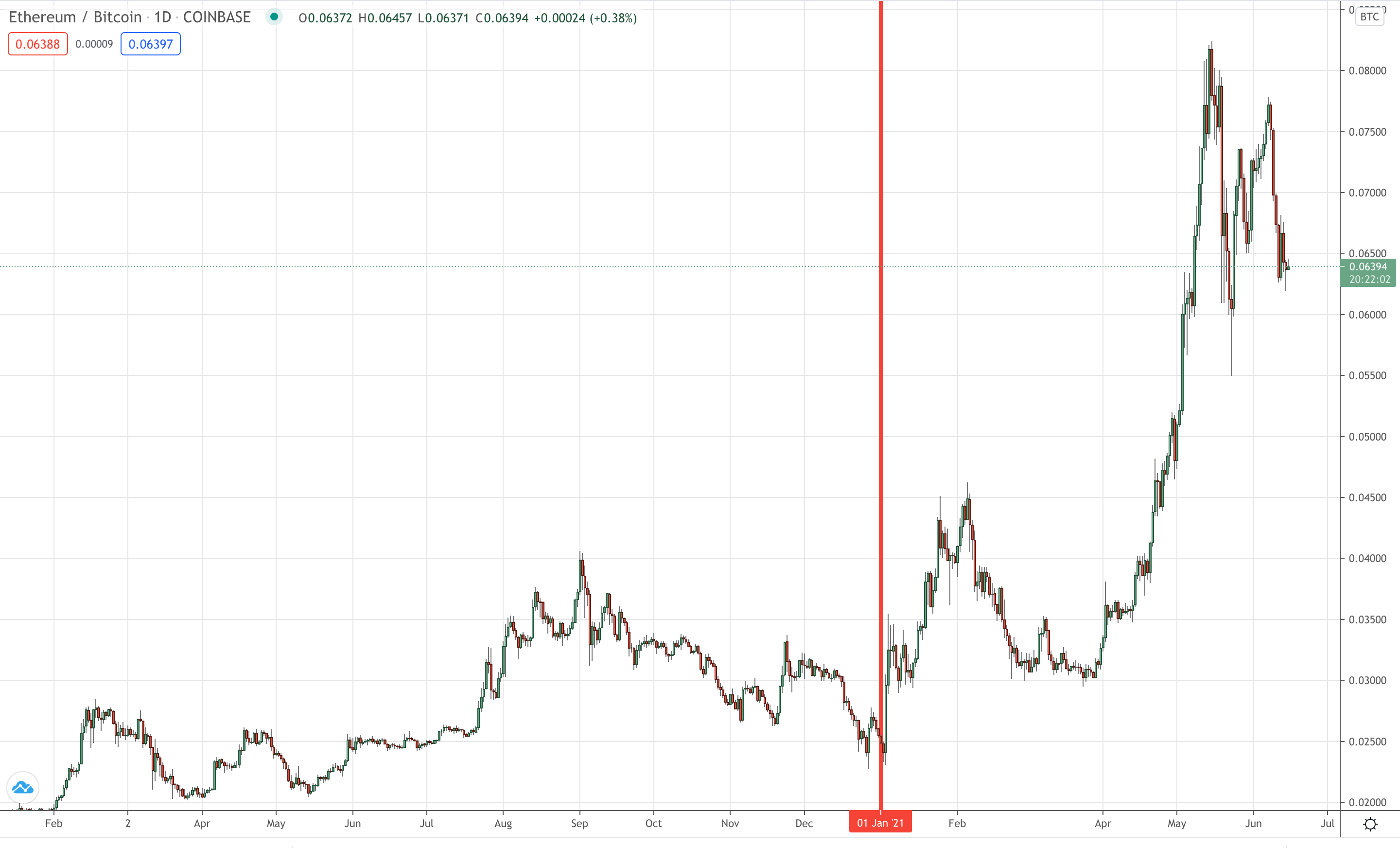
As we’re talking about buying ETH right now, we definitely subscribe to the old trading saying of ”the trend is your friend”.
As the Ethereum network continues to see more and more dApps built on top of it, it’s only natural that demand for ETH will grow alongside it and that’s exactly what we’re seeing happening now.
But when it comes to which is the better buy right now, our opinion is that it doesn’t really matter.
This is because both Ethereum and Bitcoin are blockchains that are here for the long term, each solving different use cases.
As a result, we’re likely to see both endure the test of time including whatever rollercoaster market cycles we’re likely to see in the future.
How to buy Ethereum (ETH)
As the second largest cryptocurrency by market cap, buying ETH is a relatively simple process.
You are able to buy ETH on pretty much every single crypto exchange out there, including the major exchanges we always recommend in Binance and Bittrex.
Let’s go over a few simple steps on how to buy ETH below.
Choose your favourite crypto exchange.
Deposit the fiat or cryptocurrency of your choice.
Select buy ETH either directly or via the ETH/USD trading pair.
Transfer your ETH off the exchange and into your own wallet.
As you can see, buying ETH is simple and by following step 4, you’re able to either safely keep your ETH in cold storage, or in a MetaMask wallet to interact with Ethereum based dApps at your leisure.
LeoFinance Crypto Guides.
Why not leave a comment below and share your thoughts on our guide to Ethereum? All comments that add something to the discussion will be upvoted.
This Ethereum guide is exclusive to leofinance.io.
Posted Using LeoFinance Beta
A few moments ago I just posted to my blog this entry:
There's a subtopic I hadn't addressed: Defi ETH vs BSC. As I'm waiting for RCs to replenish a bit I'll do resarch on this subtopic so it can be included.
If what I posted is good enough to include in the guide, feel free to use what you need from it. If it requires the subtopic Defi ETH vs BSC, I'll add to it as soon as I'm able to post again.
Thanks for starting this ambitious content project!
Posted Using LeoFinance Beta
UPDATE-- I went back to my post and added DeFi ETH versus BSC as a comment to it. I hope this helps!
Posted Using LeoFinance Beta
Thanks heaps mate, this is good content!
I'll make sure you get your cut of the rewards and try to spruik up a few more upvotes in LeoMarketTalk for your work.
It deserves it :)
Posted Using LeoFinance Beta
Hey guys,
I will upvote anyone who contributes content to this Ethereum guide and transfer all final blog rewards to contributors.
To earn LEO:
Pick any of the subheadings from that template and publish content on your own blog.
Link back to 'https://leofinance.io/@crypto-guides/what-is-ethereum-eth', anywhere in your blog using relevant anchor text.
That's it.
Leave a comment and let me know if you're able to help by publishing a post on your own blog.
Posted Using LeoFinance Beta
Congratulations @crypto-guides! You have completed the following achievement on the Hive blockchain and have been rewarded with new badge(s) :
Your next target is to reach 50 replies.
You can view your badges on your board and compare yourself to others in the Ranking
If you no longer want to receive notifications, reply to this comment with the word
STOPCheck out the last post from @hivebuzz:
Support the HiveBuzz project. Vote for our proposal!
All author rewards have now paid to contributors of this Bitcoin guide.
Contributors:
@kevinnag58: +1.731 LEO
@magnacarta: +1.731 LEO
@finguru: +1.731 LEO
Thanks guys.
The author rewards on this particular crypto guide were a bit lower this week.
I hope the 100% LEO upvotes from @forexbrokr on your blogs made it a little more worthwhile :)
Posted Using LeoFinance Beta
This is a very good guide to Ethereum. I will create back links to this post in my posts about Ethereum, starting with my post on wrapped tokens. I came here to get the link, but stayed to view the article.
Posted Using LeoFinance Beta